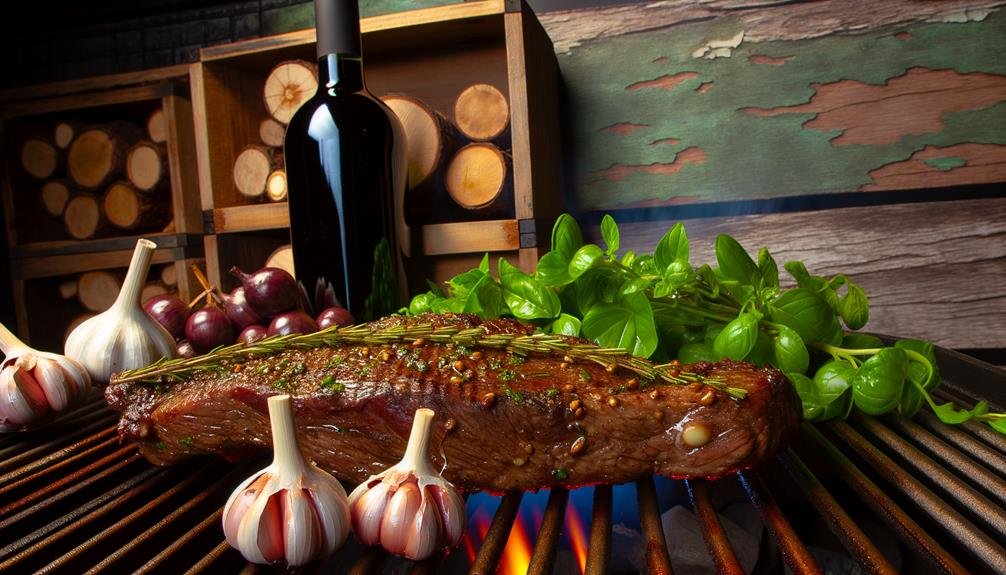Mastering wine marinades is a delightful journey into enhancing the flavors of meat with the subtle notes of wine. By carefully selecting the right wine, whether it's a bold red or a crisp white, and combining it with herbs and spices, you can elevate a simple cut of meat into a culinary masterpiece.
The key to success lies in finding the perfect harmony and using the right marinating techniques. This adventure begins with understanding what makes a marinade effective and progresses to the finer points of execution, promising to take your cooking skills to the next level.
What's in a Marinade?

Marinades are a mix of acidic components, oils, herbs, and spices used to enhance the flavor and tenderness of meat. The diverse combinations of these ingredients can turn a regular piece of meat into a remarkable culinary delight.
Fruit juices, often found in marinades, contain enzymes that help tenderize the meat, although the exact impact on flavor and tenderness is still debated.
This guide delves into the innovative practice of using wine in marinades. Wine not only adds depth to the taste but also provides varying levels of acidity, which work well with different types of meat.
Essential Ingredients
To enhance your culinary creations, it is crucial to grasp the key components of a marinade. The essential ingredients consist of acids, oils, herbs, and spices, each playing a crucial role in elevating your dishes.
Acids like wine, vinegar, and lemon juice work to tenderize the meat by breaking down proteins. Oils, such as extra virgin olive oil or innovative options like sesame or avocado oil, serve as a medium for infusing flavors and retaining moisture.
Herbs like rosemary, thyme, and basil introduce aromatic elements, while spices such as black pepper, paprika, and cumin add depth and heat to your marinade. When these elements are combined thoughtfully, they have the power to transform ordinary dishes into extraordinary culinary delights, making wine marinades a sophisticated addition to your cooking repertoire.
Assembling a Marinade

When creating a marinade, it's crucial to achieve a harmonious balance of acid, oil, herbs, and spices to enhance the flavor and texture of your meat. Start by selecting an acid like wine, vinegar, or citrus to tenderize the meat effectively. Pair this with an oil such as extra virgin olive oil or avocado oil, which not only carries the flavors but also helps in retaining moisture for juicy results.
Be mindful in choosing herbs like rosemary, thyme, or basil, as they can elevate the taste without overpowering it. Additionally, incorporating spices like black pepper, paprika, or cumin can add depth and a hint of heat to your marinade.
For example, a red wine marinade with garlic, thyme, and a touch of black pepper can work wonders on a beef steak, infusing it with rich flavor and tenderness. Similarly, a citrus-based marinade with cilantro, cumin, and paprika can bring a zesty kick to grilled chicken, making it a flavorful delight for your taste buds. By paying attention to these elements and their proportions, you can create marinades that transform ordinary meats into extraordinary culinary delights.
Marinating Techniques
To ensure your meat is packed with flavor and tenderness, mastering the art of marinating is crucial. Start by selecting a non-reactive container like glass or stainless steel to avoid any unwanted reactions.
Fully submerge the meat in the marinade for even distribution of flavor. Piercing the meat allows the marinade to seep in deeper, enhancing both taste and texture. It's important to refrigerate the marinating meat to prevent bacteria growth.
The marinating time varies depending on the type of meat: poultry needs less time compared to beef, while fish requires the shortest marination period to avoid becoming too soft. Here is a helpful guide for marinating times:
- Poultry: Minimum 2 hours, Maximum 24 hours
- Beef: Minimum 4 hours, Maximum 48 hours
- Fish: Minimum 30 minutes, Maximum 2 hours
- Pork: Minimum 3 hours, Maximum 24 hours
- Lamb: Minimum 4 hours, Maximum 24 hours
Tri-Tip Marinade Recipe

Let's dive into a delicious Zinfandel Rosemary Marinade tailored for tri-tip to showcase the marinating techniques we've discussed. This marinade combines the bold flavors of Zinfandel with the aromatic essence of rosemary, resulting in a symphony of flavors that elevate the natural richness of the beef.
This innovative recipe features key ingredients such as Zinfandel wine, which contributes acidity and depth, fresh rosemary for a fragrant, earthy touch, garlic cloves to enhance the savory profile, and olive oil for even flavor distribution and meat tenderization.
For optimal results, marinate the tri-tip overnight to ensure the flavors fully infuse the meat. This marinating method highlights the incredible impact a well-crafted marinade can have, guaranteeing a succulent and flavorful outcome that will impress your taste buds.
Conclusion
Mastering the art of wine marinades involves blending wine, herbs, and spices to create a harmonious mix of flavors and textures. This culinary skill, based on precise techniques and thoughtful ingredient choices, elevates regular meat dishes into extraordinary culinary delights.
By grasping the key elements and following marinating guidelines, one can achieve a tender, flavorful dish. This journey in crafting wine marinades highlights the significant impact of careful preparation in the culinary realm.